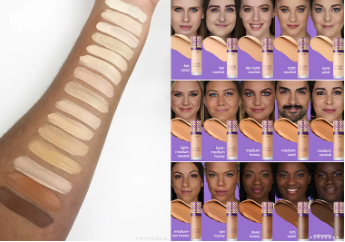The first time I was able to find a shade of foundation that matched my skin tone in Sephora was 2018. Fenty Beauty had released their Pro Filt’r Foundation a few months before, and it had been consistently sold out. I wanted that foundation so badly, I remember dragging my rightfully annoyed mother to the store, picking out my shade and overenthusiastically paying for it with a gift card. I was 16 and obsessed with makeup. In fact, I still am, which is why I am so disappointed to see how little has truly changed.
Any person of color who follows the beauty industry will tell you that something changed after the launch of Fenty Beauty in 2017. The brand came out with 40 foundation shades — basically unheard of for a brand with that level of prestige — in its very first launch. Other high-end and mid-range brands began launching new complexion products with much wider shade ranges than they ever had before or expanding the ranges of their current products. I would love to think that they did this because they had a desire to be inclusive, but the real reason was most likely profit. In September 2017, department stores sold one Pro Filt’r Foundation every minute. Other brands were all too eager to achieve this level of success, especially if all they had to do was add new shades to an existing product line. But at the end of the day, isn’t the fact that they expanded their range good enough? Isn’t that what I wanted?
The answer to both of these questions is no. Sure, finding my shade in Sephora was a pretty significant moment, but if anything, it highlighted how deeply the beauty industry has failed people of color. What I actually want is for brands to make all of their products inclusive and hire people of color to design and create their products. Although complexion products get the most attention, any darker skinned person will tell you that many brands release eyeshadow palettes, highlighters, blushes and lip products that are useless for us. I own many eyeshadow palettes with shades that don’t even show up on my skin. I bought face palettes because they were marketed to “everyone,” but it is clear that many makeup brands consider “everyone” to be people who are much paler than me. What makes me even more frustrated is that I’m not particularly dark-skinned, so if I’m being excluded, it’s safe to say that a lot of other people are too.
In the past two years, Sephora and Ulta have begun to prominently feature Black and non-Black POC-owned brands. After the racial justice protests last summer, they gave Black-owned brands their own sections in stores and online. I find it upsetting that it took such drastic action for these companies to give Black-owned brands the same treatment they had been giving brands like Anastasia Beverly Hills and Too Faced for years. I think part of this pressure came from the “Pull Up or Shut Up” campaign, which was started by UOMA Beauty founder Sharon Chuter. “Pull Up or Shut Up” called out companies that released statements supporting the BLM movement while refusing to create products that Black people could even use. Chuter’s goal was to push these companies to publicly disclose how many Black people were on their staff. Among the companies that disclosed their staff data, the results were absolutely abysmal, and sadly, I wasn’t surprised.
While some brands have taken positive actions in response to the backlash, others have doubled down or changed nothing at all. There are many brands that continue to release shade ranges that exclude darker skinned people. They make no effort to hire Black models or any models of color to show their products. They manufacture outrage with their terrible shade ranges and lack of diversity, because they know their actions will generate backlash — to them, any publicity is good publicity.
I am not the first person to note the lack of diversity in the beauty industry. In fact, people have been doing so for years, only to witness insufficient change. For about 40 years, the industry pretended people of color didn’t exist. For the next 10, they made the bare minimum effort to include us. Now, in the past few years, they’ve only undertaken a few performative actions to appease us.
So what can we do? As much as I would like to, I don’t own my own makeup brand. However, in the end, makeup companies are still companies. They depend on people buying their products. We know that boycotting brands is effective; boycotts forced many brands to make their products vegan and cruelty-free. It can also force them to diversify their product line and hire people of color. In addition to this, we should make an effort to buy from POC-owned brands that release inclusive products. I would recommend UOMA Beauty, Beauty Bakerie, Juvia’s Place, Meera’s Beauty Co, Fenty Beauty, Pat McGrath, Alamar Cosmetics, Melt Cosmetics, Huda Beauty and Farsali. After all, when mainstream brands have shown time and again that they don’t care about us, why shouldn’t we buy from brands who do?
Makeup is supposed to be fun, and makeup is supposed to be for everyone, regardless of race or gender. Ironically, everyone seems to have realized this except for the makeup brands themselves. They are failing their consumers, and they need to do better.




